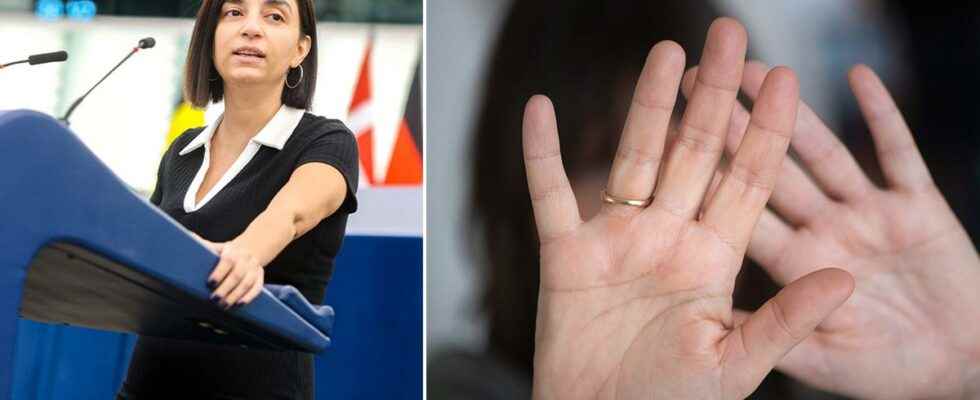Published: Just now
Consent laws must be introduced throughout the EU and female genital mutilation must be banned.
These are two of the proposals presented when the EU negotiates comprehensive legislation regarding men’s violence against women and violence in close relationships.
– The situation for women and girls around Europe is acute, says Evin Incir (S), chief negotiator for the directive.
More than one in five women has been subjected to violence in close relationships and one in two young women has been subjected to online violence, shows a review by the European Commission.
– Men’s violence against women is one of the most urgent problems in the EU right now. It has also worsened during the pandemic because women and girls have been forced to stay at home with their perpetrator, says Evin Incir (S).
Now the EU must take a comprehensive approach to the issue and produce legislative proposals at EU level that relate to men’s violence against women and violence in intimate relationships.
– This is a historically comprehensive proposal. In many European countries, we see a decline in terms of gender equality and then it is necessary that the EU member states take a joint action and fight these disgusting crimes that do not respect time or space and that take place in all countries and social classes, says Evin Incir who will to lead the negotiation on EU legislation.
“Must make sure that a no is a no”
The bills will, among other things, deal with banning genital mutilation, extending statutes of limitations, strengthening contact bans and introducing consent legislation.
– Right now, less than half have consent legislation, but in all EU member states we must ensure that a yes is always a yes and a no is always a no and that must be respected. I will also propose that consent should not be bought when it is about rape, says Incir.
What will the new legislative proposals mean for Sweden?
– No country has perfect legislation in place and in Sweden it will mean a tightening, including regarding violence against women online. It will also lead to tougher penalties and the maximum penalty for rape will be increased. But also about increasing the knowledge of and improving cooperation between various relevant authorities. This will bring changes for all Member States to prevent and increase the fight against these crimes.
The first proposals will be presented in December, and Evin Incir hopes that negotiations with the member states can begin in the spring.
– Unfortunately, I expect opposition from right-wing nationalists regarding some of the proposals, but I hope that through a broad majority in the European Parliament, we will make the member states in the Council realize that crimes against women and children are an emergency we can no longer turn a blind eye to.
Facts
Here you can get help and support
Are you or someone close to you exposed to violence in a close relationship? Here is a selection of places you can turn to for help and support.
Important: Always call 112 in case of emergency. You can also reach the social service or the social emergency service in your municipality via the emergency number.
A national helpline for those who have been exposed to physical, psychological and sexual violence. Relatives and friends are also welcome to call.
Offers temporary sheltered housing for people who have been victims of intimate partner violence and honour-related violence. Accepts women, men, their children and accompanying animals with placement via social services.
The national organization for women’s shelters and girls’ shelters in Sweden collects shelters throughout Sweden, some of which offer sheltered accommodation. Find an on-call nearest you via Rok’s website. Click on “find an on-call”.
Collects over 130 women’s shelters, girls’ shelters and other support activities. On the website there are contact details for emergency services throughout Sweden, some of which offer sheltered accommodation. Click on “find on duty”.
Network for women’s rights against men’s violence. Emergency phone: 020-52 10 10. Advice in 70 different languages, including legal advice.
Provides support to criminal suspects, witnesses and relatives.
A women’s shelter for abused women with experiences of abuse and prostitution.
Support for LGBTQI people who have been exposed to violations, threats and violence. RFSL support reception also runs a sheltered accommodation in the Stockholm area.
If you want to talk to someone who works at social services, you can call the switchboard in your municipality and ask to be connected to social services.
All children can get help via Bris, Children’s rights in society.
Can help with emergency call and crisis support: Call 112 and ask to be connected to the priest on duty.
A support platform for young people (15–20 year olds) who are exposed to violence in their partner relationships, offers chat every evening at 8–10 pm.
Choose to stop is a national telephone line for those who want help to change controlling or violent behaviour. The telephone line is run by the Stockholm County Administrative Board in collaboration with Manscentrum Stockholm and in collaboration with Sweden’s county administrative boards.
Read more
